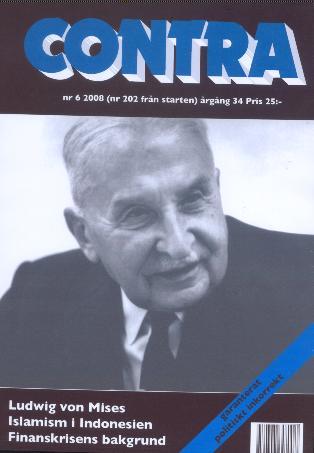
Swedish aid used for wars in Africa
by Tommy Hansson
In Sweden the goal of giving one per cent of Gross National Income in development aid has become somewhat of a holy cow. How the aid is used is less important than the size of it. But how is it used? The TV reporter Bengt Nilsson shows in a new book that aid to Africa often is used by the receiving countries to finance wars and conflicts.
Islamist terror in Indonesia
by C G Holm
Indonesia is the most populous country with a moslem majority. Islam is however fairly recent in Indonesia, with the exception of the Aceh province in the northwest, which became moslem in the 930s. For the rest of Inodnesia it was not until the end of the 16th century that islam was introduced – at the expense of hindu and buddhist kingdoms, that were crushed by the moslems.
The national government has since the establishment of the indpeendent state (in 1949) been secular and in principle neutral between six approved religions. But on a lower political level politicians in charge often attack those with differing views. The terrorist attack on Bali in 2002 was not only aimed at Western tourists but also at the hindu locals on Bali, who were seen leading an immoral and non-moslem lifestyle. In the subarchipelago South Moluccas Christinas have been attacked repeatedly by moslem invaders, especially from the very overcrowdsed island of Java. Javans move to less populated islands and grab land at the expense of the locals. And if the victims are Christians (or hindus) imams approve of occupation and arson against the former inhabitants. People are chased away from villages where they have lived for generations, or they are killed.
The regulations introduced by Jimmy Carter were the origin of the financial crisis
by C G Holm
The financial crisis, first visible in the failure of the subprime loans in the United States, has developed into one of the most severe financial problems during the last seventy years. Not unexpected statists cry for more regulations. But if you analyze the problems you will find that the problems basically were created by regulations, the wrong regulations.
The cornerstone of the present crisis was laid by President Jimmy Carter and as always the road to hell has been full of good intentions. During the 1970s and the 1980s the inner parts of American cities were turned into slums as affluent people moved into the suburbs (in Europe the development was the opposite, the wealthy stayed in the cities and poor people had to move to cheaper dwellings in distant suburbs). Carter started regulating (the first was the Community Reinvestment Act) in order to force financial institutions to lend to people that had limited credit worthiness. And when one regulation failed there was another added on top, all the way until todays collapse of “the house of cards” created by regulations.
Israel is prepared to take measures against Iran
New Israeli ambassador to Stockholm is Benyamin ”Benny” Dagan, a career diplomat who previously have been located in Cairo, Chicago and Washington, D.C. Contra was present when Ambassador Dagan presented his views in October.
FBI, Hoover and the struggle against Communism
by Bertil Häggman
The centenary of the FBI has hardly been noticed on this side of the Atlantic. President Theodore Roosevelt and his Secretary of State Charles Bonaparte in 1908 created a force of specialist police. On March 16 1909 it was named Bureau of Investigation. The FBI played an important role in the Cold War and the fight against Communism.
Ludwig von Mises is able to explain the present financial crisis
by Fredrik Runebert
Ludwig von Mises (1881-1973) was one of the “Austrians”, also represented by Friedrich A. Hayek, Carl Menger and Eugene von Böhm-Bawerk. Mises was a classic liberal advocating free market economics and stressed distribution of labour as one of the major means of improving wealth in society. His most important contribution to economic theory is the business cycle theory, which in a more refined form gave his follower Friedrich A. Hayek the Nobel Prize in economics in 1974, one year after the death of Mises. During his active years he produced many books, of which Human action: A treatise on economics from 1949 was the most important. He was however in economic science regarded as somewhat odd, and not accepted in the mainstream of economists. But today there is no doubt that his influence has been significant.
The Princess who hated Communism
by Tommy Hansson
This year it was exactly 100 years since the birth of the Princess of Sweden (and mother of the present King) Sibylla at the Friedenstein Palace at Gotha, as daughter of Duke Karl Edvard of Sachsen-Coburg-Gotha and the Princess Viktoria Adelheid of Schleswig-Holstein. The father was cousin of the brother-in-law of King Gustavus VI Adolphus, Arthur, Duke of Connaught. On October 20 1932 Princess Sibylla in Coburg married the heir of the Swedish throne, Prince Gustavus Adolphus, son of the Crown Prince Gustavus Adolphus (later king Gustavus VI Adolphus). After a honeymoon spent in Italy and Egypt the couple moved to Haga Palace in Stockholm.
Sweden as a country of second class
by Stig Daun
Two important events has contributed to the fact that Sweden has dropped out of the “major league” of Western nations:
1. The introduction of the comprehensive school in the 1960s, when exams were abolished as well as grades during the first seven years of school.
2. The Employment Security Act passed in 1974, which made it hard for young people to get an employment after school, as the already employed were given a lot of privileges.

